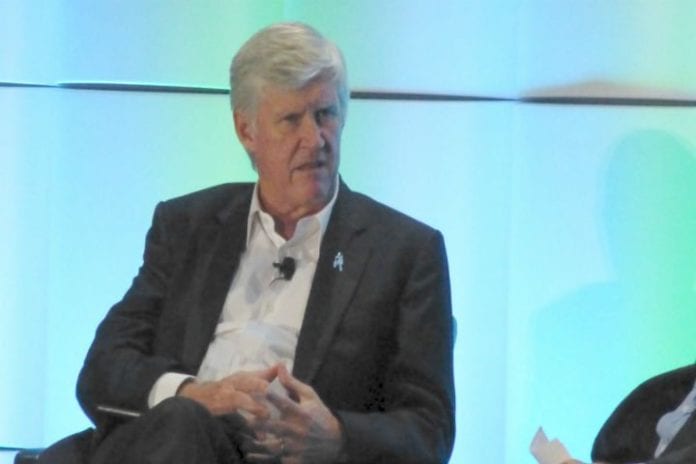Long-time industry exec John Stanton heaped praise on T-Mobile, but continues to show concern regarding market’s ability to support 4 nationwide operators
SEATTLE – Following a five-year absence, wireless industry veteran John Stanton returned to the stage at the Competitive Carriers Association’s Annual Convention to provide some insight into his views on the current mobile telecom landscape and suggestions on how CCA members can remain competitive in the market.
Stanton, who last appeared at CCA when the trade group was known as the Rural Cellular Association, started off by expressing concerns over the financial health of the space, noting carriers are having to fork over significant investments for spectrum and infrastructure while at the same time seeing flattening revenue.
“The dynamic structure does not allow us to get paid,” Stanton said.
The long-time industry exec did note that there are “exciting services and partnerships” available to mobile operators that could allow for future growth, but that carriers needed to think differently about their position in the ecosystem and look toward network generational changes as a potential time in which to perhaps move on that potential differentiation.
One of those partnership opportunities could involve a deal with cable giant Comcast, which recently announced plans to dive deeper into the mobile telecommunications space through a mobile virtual network operator agreement with current market heavyweight Verizon Wireless. Stanton noted that with Comcast’s vast collection of content and market reach, rural carriers that don’t necessarily compete with the firm could prove to be a good source of applications and services to allow for differentiation in the market.
Stanton did acknowledge the cable giant has a lot of money and a unique opportunity due to its dual service set identifier move that basically turned all of its consumer Wi-Fi modems into customer hot spots, but that might not be enough in such a competitive environment.
“With four nationwide carriers, the notion you are going to deliver a service means you need to price down. That’s hard to do,” Stanton said, adding the company also will have to deal with device powerhouses like Apple and Samsung in terms of supporting its unique Wi-Fi-first business model and bolster its own retail presence.
“I don’t view them as a threat, at least if they continue down their current plans,” Stanton noted. “They will fail miserably.”
Stanton had similar skepticism in regard to new network entrants looking to serve the “internet of things” market. He did note that there was a great opportunity in the IoT space, but that if “existing players attack the new positions, you foreclose the opportunities for new entrants.”
As for larger carriers, Stanton said he continues to view the current model of four nationwide operators as unsustainable from a revenue perspective, and that the domestic market is ideally positioned to support three nationwide carriers on an ongoing basis. During his previous visit to the trade show, Stanton said he was in favor of AT&T’s then pending acquisition of T-Mobile US, which was eventually shot down by regulators.
Now, Stanton views an eventual tie up between T-Mobile US and Sprint as a positive competitive and economic move.
“I am glad the T-Mobile and AT&T deal did not happen, but think there should be a T-Mobile and Sprint deal,” Stanton said, explaining such a partnership would create the opportunity to bolster their business and accumulate the capital needed to be more competitive in the market.
“In terms of free cash flow, I don’t think there has been a time when, combined, they have been able to post positive results,” Stanton added.
As for his former carrier, Stanton heaped praise on the current leadership at T-Mobile US, citing the exuberance of current CEO John Legere.
“John is kicking ass and taking names,” Stanton said. “I might have been more conservative.”
Stanton’s history in the mobile telecom space includes being instrumental in the founding of McCaw Cellular before going off on his own to found – and sell – Western Wireless and VoiceStream Wireless, before joining Clearwire as a board member and CEO prior to its sale to Sprint. Stanton is now head of Trilogy Partners International, which includes an investment arm and oversees cellular operations in Bolivia and New Zealand.
Bored? Why not follow me on Twitter

